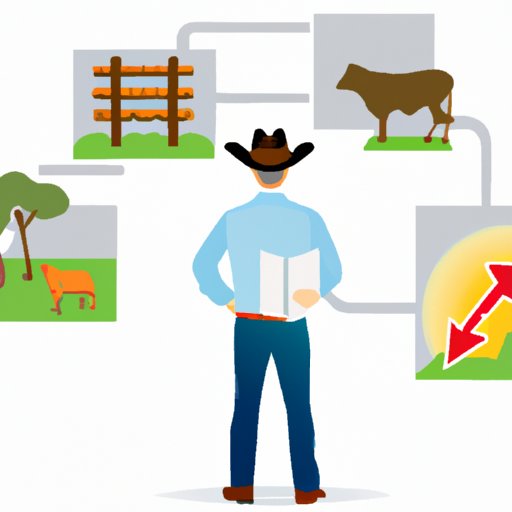Introduction
A ranch business is a venture that involves running a farm or ranch for the purpose of raising livestock, such as cattle, horses, sheep, goats, pigs, chickens, and other animals. It can also involve growing crops, such as hay, wheat, corn, and oats. Starting a ranch business requires extensive planning, research, and investment.
This article will provide an overview of the process of starting a ranch business, including the steps you need to take, the financial investment required, the legal and regulatory requirements, the different types of ranches and their pros and cons, and the necessary skills, knowledge, and experience needed to successfully operate a ranch business.
Steps to Starting a Ranch Business
The following are the steps you need to take in order to start a ranch business:
1. Identify the Type of Ranch Business You Want to Start
The first step in starting a ranch business is to identify the type of ranch you want to start. There are several different types of ranches, including cattle ranching, horse ranching, dairy ranching, sheep ranching, hunting ranching, and organic ranching. Each type of ranch has its own unique set of advantages and disadvantages, so it’s important to do your research and determine which type of ranch best suits your needs and goals.
2. Research the Local Market and Competition
Once you have identified the type of ranch you want to start, it’s important to research the local market and competition. This will help you understand the current demand for your product or service, as well as the competition you may face. It’s also important to research the local laws and regulations that could affect your ranch business.
3. Create a Business Plan
Creating a business plan is an essential step in starting any business. A business plan should include an executive summary, market analysis, operational plan, financial plan, and risk assessment. It should also include a detailed description of the type of ranch you plan to start, the products or services you plan to offer, and the target market you plan to serve.
4. Secure Financing
Securing financing is another important step in the process of starting a ranch business. Depending on the size and scope of your ranch, you may need to secure financing from a bank, private investors, or government grants. It’s important to research all available financing options and determine which one is best suited for your needs.
5. Acquire Land and Resources
Once you have secured the necessary financing, it’s time to acquire the land and resources needed to start your ranch business. This may include purchasing land, equipment, and livestock. It’s important to research the local market and compare prices to ensure you get the best deal possible.
6. Obtain Necessary Permits and Licenses
In order to legally operate a ranch business, you will need to obtain the necessary permits and licenses. This may include building permits, zoning permits, and agricultural permits. It’s important to research the local laws and regulations to ensure you are in compliance with all applicable laws.
7. Hire the Right Staff
Hiring the right staff is an essential step in operating a successful ranch business. You will need to hire experienced and knowledgeable staff who are capable of running the day-to-day operations of the ranch. It’s important to hire staff who share your vision and values and are committed to helping you achieve your goals.
8. Market Your Ranch Business
The final step in starting a ranch business is to market your business. This may include creating a website, advertising in local publications, attending trade shows, and networking with other ranchers. It’s important to develop a marketing strategy that will help you reach your target market and stand out from the competition.

Financial Investment Needed to Start a Ranch Business
Starting a ranch business requires a significant financial investment. The cost of land, equipment, and livestock can be expensive, as can the cost of labor. Additionally, there are many operating expenses associated with running a ranch business, including fuel, feed, veterinary services, insurance, and taxes. It’s important to thoroughly research the costs associated with starting a ranch business and create a budget that will cover all expenses.
Legal and Regulatory Requirements
In addition to the financial investment needed to start a ranch business, it’s important to understand the legal and regulatory requirements. These may include local zoning regulations, federal and state regulations, and environmental regulations. It’s important to research all applicable laws and regulations and ensure you are in compliance.

Different Types of Ranches and Their Pros and Cons
As mentioned earlier, there are several different types of ranches, each with its own unique set of advantages and disadvantages. Here is a brief overview of the different types of ranches and their pros and cons:
Cattle Ranching
Cattle ranching is one of the most popular types of ranch businesses. It involves raising cows for meat and dairy production. The main advantage of cattle ranching is that it can be profitable if done correctly. However, it also requires a large amount of land and resources and is subject to market fluctuations.
Horse Ranching
Horse ranching involves breeding, training, and boarding horses. The main advantage of this type of ranch business is that it can be profitable if done correctly. However, it also requires a large amount of land and resources and is subject to market fluctuations.
Dairy Ranching
Dairy ranching involves raising cows for milk production. The main advantage of this type of ranch business is that it can be profitable if done correctly. However, it also requires a large amount of land and resources and is subject to market fluctuations.
Sheep Ranching
Sheep ranching involves raising sheep for meat and wool production. The main advantage of this type of ranch business is that it can be profitable if done correctly. However, it also requires a large amount of land and resources and is subject to market fluctuations.
Hunting Ranching
Hunting ranching involves managing land for recreational hunting purposes. The main advantage of this type of ranch business is that it can generate a steady income from hunting fees. However, it is subject to local laws and regulations, and it requires a large amount of land and resources.
Organic Ranching
Organic ranching involves raising animals and producing crops without the use of synthetic chemicals or genetically modified organisms. The main advantage of this type of ranch business is that it can be profitable if done correctly. However, it also requires a large amount of land and resources and is subject to market fluctuations.
Necessary Skills, Knowledge, and Experience Needed to Successfully Operate a Ranch Business
In order to successfully operate a ranch business, it’s important to have the necessary skills, knowledge, and experience. This includes management skills, agricultural knowledge, animal husbandry knowledge, and business acumen. It’s also important to have a thorough understanding of the local market and competition, as well as the legal and regulatory requirements.
Conclusion
Starting a ranch business is a challenging but rewarding endeavor. In order to successfully start a ranch business, it’s important to understand the steps you need to take, the financial investment required, the legal and regulatory requirements, the different types of ranches and their pros and cons, and the necessary skills, knowledge, and experience needed to successfully operate a ranch business.
(Note: Is this article not meeting your expectations? Do you have knowledge or insights to share? Unlock new opportunities and expand your reach by joining our authors team. Click Registration to join us and share your expertise with our readers.)
